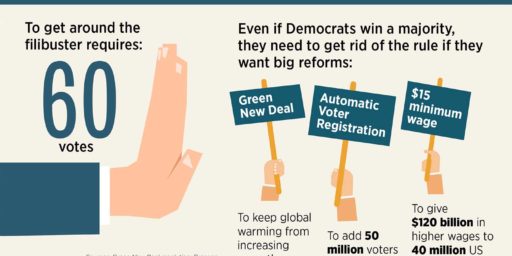Looking to the New Congress
NPR has a short piece on the coming Congress that is worth a read: Some Not-So-Conventional Wisdom About The Next Congress.
The piece counters what it perceives as the conventional wisdom on the coming Republican control of both chambers:
1. Republicans are going to have to show they can govern.
[…]
2. House Democrats will be totally irrelevant.
[…]
2 1/2. The president will start wielding the veto pen.
#1 is problematic right out of the gate as it ignores a) the general difficulty of legislating in the US system (as I continually note: no party truly controls the Senate unless they have 60 votes), and b) the fact that governing requires control of the legislature and the executive (and so even a flurry of legislating will not equate to governing).
#2 points out that the the House Republicans have not been unified and they will continued to be factionalized going into the next session. Remember: Speaker Boehner had to abandon the so-called Hastert Rule and utilize Democratic votes to keep the government open recently–and when he stuck to Reps only we ended up with a government shutdown.
In short, it is unlikely that there will a massive amount of legislative output that will, in turn, spark a massive confrontation with the White House.






Well that’s disappointing.
2 more years of noise and little or no substance.
The biggest thing I see is that House Republicans will force the CBO to use dynamic tracking, in other words magical mathematics, in order to justify tax cuts for the wealthy.
But the last week in Kansas has shown clearly what an abject failure the Republican agenda is.
http://www.kansascity.com/opinion/opn-columns-blogs/yael-t-abouhalkah/article5332056.html
And then of course there are all the Republican predictions that just never come true.
http://thinkprogress.org/economy/2015/01/01/3607416/4-things-2015-obama-reelected/
And Senate Republicans will claim a mandate even though……..
http://www.fairvoteblog.com/2014/12/with-louisianas-senate-runoff-election.html?m=1
So in short…2 more years of Republican fiction versus the real world.
The only thing I’m looking to the new congress to do is not to screw up too badly. With Republicans in control, that will be a tall order, but it’s possible.
I did like this from the link, though:
This is Gory Gardner talking to the Coloradans who elected him. It is not, however, the GOP gameplan.
Nor is this from Ponnuru:
I wonder, what right-wing GOP-voter elected a Republican congress so they can “do the basics” or to “keep the government open for business?” Seems to me that if those are the things you’re interested in, you’re probably not voting Republican.
A way forward, or as Clavin says, more “Republican fiction?”
If the Republicans were smart they’d do immigration reform with Mr. Obama just to take the issue off the table.
They’d wait long enough to see whether the Supremes will gut Obamacare, and if not, they’d suck it up and start working on tweaks.
Neither will be a winning issue for them in the general in 2016. But then, what will? What does the GOP stand for aside from hatred of Obama and slavish bootlicking of Wall Street?
They’ve lost the gay issue. There’s at present no galvanizing foreign policy issue. Abortion has become a local fight. There’s comprehensive tax reform but they’ll decide not to attempt that until after 2016. Their obsessions – Keystone XL, Benghazi, the IRS – have all been rendered irrelevant. And their economic theories are baloney and if put into practice would just crash the economy in time for them to be blamed.
Seriously: what is the GOP agenda? The unifying force is hatred of Barack Obama, and Mr. Obama is already thinking about where to live post White House.
In the absence of anything close to an actual governing agenda, and with primaries coming, they’ll be driven by their extremes. They’ll attack environmentalists, they’ll attack immigrants, they’ll try for more voter suppression, they’ll try to deprive more Americans of health care, they’ll push ever crazier gun laws, and the so-called mainstream Republicans will stick to toadying Wall Street.
Hah. Just saw this: http://www.politico.com/story/2015/01/mitch-mcconnell-senate-republicans-agenda-113951.html?hp=r1_3
McConnell’s top priority is Keystone XL. Good lord. And what has he got if Obama says, “Eh, okay?”
One fear with the Republicans running Congress would be if we are attacked or provoked into war. An enemy can clearly see our governing weaknesses. We may have the biggest military in the world, but if Congress cannot declare war because it’s something President Obama wants – we might as well not have spent the money on those weapons.
Here are some things for Congress and the President that would help the country:
tax reform: go to a flat tax. This would simplify the tax forms to the size of a post card. Every year millions of people go through the hand wringing, hair pulling, night sweats, panic attack, medieval torture of filling out the Byzantine maze of income taxes by April 15. This would put and end to that. And end the loopholes. It would be fair.
Rebuild, upgrade, and modernize the aging, antiquated electrical grid. Some of the stations and generators date back to Edison and Franklin. This would be a long term project and provide a lot of jobs. This would not be some government boondoggle that wastes tax money on grants for projects like the infamous study of why kids fall off tricycles or a study of twitter. This would make the energy system more efficient, saving billions a year in costs. It would provide greater protection against a total breakdown resulting from a terrorist attack or a solar storm.
Energy research: there needs to be a consortium of scientists, inventors, and developers that would work on new energy sources and devices. Lockheed has already made a breakthrough on a fusion generator. Other projects that show promise are the hydrogen fuel cells, gas vapor car engines, thorium reactors, even electricity from the air !
Health care act: do some fine tuning. Form a committee of private citizens. Hold hearings and get some ideas. Do away with the mandate and offer incentives, such as gift cards or vouchers. People respond better to rewards than they do to threats. And let’s do something about the information gathering requirements that now have the doctors spending more time on the laptop than talking to patients !
Taxes: how about a tax cut for the middle class working people ? That would provide some extra spending money for families.
Government reform: get some people together and come up with some ways that government could be more efficient. There are many agencies and departments that could be done away with and no one would ever notice. Eliminate excessive, obtrusive, and confusing regulations that cost businesses money and jobs. Have audits of every agency and department to find waste and fraud.
These ideas would keep Congress and the President busy and off the golf courses for next two years.
see:: lockheedmartin.com/us/compactreactor
popsci.com/svience/article/2010-08
@michael reynolds:
Even more important…what if he spends a bunch of political capital and then they don’t build it because oil prices are too low?
@Tyrell:
Flat tax…blah blah blah.
Stop watching Fox.
@Tyrell:
If by flat tax you mean a single rate, you’re going to set off a revolution once people realize it means people with good incomes (people like me) paying hundreds of thousands of dollars less, and middle class people (perhaps like you) having to pay tens of thousands more.
Flat tax is a trick the rich want to play on the middle class. You really need to look at the math, because a whole lot of people who pay nothing or next to nothing in actual income taxes (as opposed to medicare and SS) are going to get bent over and drilled hard. Real hard. My taxes would go way down, would yours?
If you mean a single rate with various negative income tax schemes to send money back to the middle class and poor then you’re reintroducing a lot of the complexity we’d both like to get rid of.
Further, there is no evidence that it would have any positive effect beyond perhaps throwing a lot of accountants and tax lawyers out of work. (Hmmm. . .)
Simpler? Sure. Flat? Not unless you absolutely insist on giving me money.
@michael reynolds:
Giving the Democrats a huge win on immigration would basically signal that the Republicans have recognized that they are irrelevant and just want to reward their own oligarchs. No political party has ever achieved anything by giving their opponents a huge policy win. If congress passes amnesty, the Democrats will be looking at being automatic winners in more states than they are today.
@michael reynolds:
I did a brief 5 minute Google research on your argument and found that the federal tax rate for a family making an average income (about $50,000 per year) is about 15%. Effective tax rate is more like 11%. The middle class, which income ranges are nearest to the average income, account for approximately 46% of all taxes. Now, for whatever reason, the “warm and cozy” number for the flat tax argument appears to be centered around 26% across the board. According to this flat tax rate I found that middle-classers on the higher end of the income spectrum wouldn’t see much of a change (federal tax rate for them is already 25%) while the middle-classers in the middle and the lower end (the majority) would get screwed. This policy would push the lower end middle-classers into the working poor class and the working poor would need significantly more welfare from the federal government. And all for what? So the wealthy can have their tax rate cut from 35% – 39% down to 26% while the new middle class pick up the majority of the share?
Again my research was a back of the envelope type of numbers crunch for the sake of adding some numbers/data to the logic. I might be missing some valuable information and it does not consider the cutting of some loopholes that is argued to accompany the flat tax policy. But I would encourage everyone to do some research on this. It will be hard not to come to the conclusion that this policy disproportionately favors the wealthy at the expense of most everyone else.
@LaMont:
That sounds right. I’m paying 39% top marginal to the IRS, so a drop to 26% would mean party time. It would basically cover the cost of California state taxes (13% top end) so instead of my net pay-out being roughly half of every dollar between feds and state it’d be closer to 37%. So yeah, a big tax cut for me.
@LaMont:
Which is, of course, why the CEC keeps feeding a flat tax to the
rubesbase.@Tyrell:
Man, are you gullible.
The important questions on your tax form are not about what the correct rate is, but about what counts as taxable income. Changing to a flat tax would not in any way simplify that.
If you go the ‘simplification’ route, and basically say that all income is taxable, then the poor get screwed, the middle class get slapped upside the head, the modestly rich laugh all the way to Club Med, and the really rich get slightly annoyed until their expensive accountants can figure out a new way to disguise their income as not-really-income.
You want real tax reform? Tax capital gains at 100% if held for less than a month, with a declining rate down to 0% for anything held more than 30 years. No more arbitrage, no more day trading, hedge funds folding left and right, and real investors (and market liquidity) affected not at all.
I’ll take a flat tax if it’s a tax on wealth instead of income.
@DrDaveT:
Wall Street may immediately crash but at least the success in Wall Street’s rebound would be more indicative of what’s happening on Main Street.
@Anonne:
Have you thought about the long term inplications of taxing savings while rewarding spending?